Emilie Richards's Blog, page 72
March 2, 2016
Four Books At Once: Multitasking Ain’t For Sissies
 This has been an odd week in an odd profession. Every day I’ve been frantically multitasking, and my desk shows it. (Don’t worry, the next line on my ridiculous to-do list says “For heaven’s sake clean off your desk!”)
This has been an odd week in an odd profession. Every day I’ve been frantically multitasking, and my desk shows it. (Don’t worry, the next line on my ridiculous to-do list says “For heaven’s sake clean off your desk!”)Four different books are the culprits. First there’s From Glowing Embers. From Glowing Embers is now free for readers everywhere. I recently advertised that fact at BookBub and the results were heartwarming. Keeping track of sales has been delightful.
Then there’s my “new idea” which I sent to my editor several weeks ago. And while the idea and title have gotten a preliminary nod, I’m waiting for editorial notes and final acceptance. Nevertheless that hasn’t stopped me from working on the book in my head. I’ve spent hours researching California immigrant groups and I’ve reconsidered names, something that always helps clarify who my characters are.
Of course I can’t forget When We Were Sisters, which debuts in June. I’ve mailed dozens of copies of the uncorrected proofs to my Krewe of Review, so they’ll have plenty of time to read the book before reviews go up. Just as exciting I’ve been working on an “extra” connected to the novel which I’ll send to readers on my mailing list as a thank you for subscribing. Nobody can say this job is boring.
Finally, I’ve spent the past two weeks revising another of my original romances, Dragonslayer. I wrote about Dragonslayer here last week, and this week I finished the edits and saw the first peek at cover mock ups. Now I have to write new back matter, figure out a blurb for the bookstores, figure out keywords etc. Dragonslayer is here to stay for a while.
Quite truthfully there have been times this week when I’ve forgotten which book I’m working on. I’ve also felt strung out, unable to sleep well because of images and ideas cascading through my mind. As you might guess lack of sleep is the enemy of creativity.
None of this is actually a surprise. Multitasking is a myth. Neuroscience research tells us we are incapable of working on more than one thing at a time. We’re simply starting and stopping quickly, a process which isn’t particularly efficient because it takes seconds in between tasks.
NPR’s Science Friday recently addressed this in an interview with Clifford Nass, a psychology professor at Stanford. Multitasking is a fact of life at college. The top 25 percent of Stanford students are using four or more media at one time whenever they’re using media. Nass says that studies have shown that people who multitask frequently are less capable of “filtering out irrelevancies.” They are chronically distracted.
Well, yeah. . .
Does constant distraction affect creativity? Nass hypothesizes that it does, because creative people take in lots of information and use it to find interesting and unusual connections. But if we are chronically distracted, that kind of deeper thinking is less likely.
Can multitasking junkies be cured?
There are lots of suggestions on the web. Try googling “multitasking cure.” Here are a few ideas I gleaned from the results, all of which sound promising to me:
List all your tasks (ongoing) and projects (with a set beginning and end) and prioritize.
Ask yourself why multitasking is so seductive and what are healthier ways you can get the same “rush.”
Choose one thing you can accomplish and schedule uninterrupted time to finish it. Then, if you have time, choose another.
Schedule social media and stick to the time you’ve allotted.
Start with the job you like least and get it over with so you won’t procrastinate later.
Cut down on your use of “devices.”
Right now, on that cluttered desk, I see my Kindle, my iPad, my iPhone and two computer screens along with stacks of paper. Surely I can start by clearing away the mess and the gadgets. And if I haven’t fatally retrained my brain “not” to concentrate, I can begin putting my projects and tasks in order and proceed calmly through my list.
I think it’s time to try. How about you? How are you addressing multitasking in your own life?
The post Four Books At Once: Multitasking Ain’t For Sissies appeared first on Emilie Richards.
February 27, 2016
Sunday Inspiration: Release Your Goddess

Buying Girl Scout cookies this week I was reminded what a great organization this is, despite warnings in the press that somehow this one and others like it are encouraging our girls to think for themselves. Personally I support all girls and women thinking for ourselves and not letting men do the thinking for us, no matter how much power they believe they hold.
Girl Scouts helps strengthen our young women to become the best they can be. I bought an extra box of cookies and left the change. Whenever possible I support turning girls into strong women.
Do you remember the girl you once were?
It’s so easy to forget the innocence, the creativity, the happiness of that time in our life before we were told who and what we are supposed to be.
It’s so important to help our daughters and grand-daughters have the courage to resist being trapped into unreasonable expectations. And the best way to do that is to show them how we are doing just that in our lives.
The best books I’ve read — and written — have inspired me to search inside me for that girl and to keep her dreams alive. Women need all the help we can get, not only from writers and other artists but from strong women who have showed us the way and continue to do so.
They are the goddesses who invite our goddess within to show others the way.
Every woman and every girl has a goddess inside her. Release your goddess. The world will be a better place.
The post Sunday Inspiration: Release Your Goddess appeared first on Emilie Richards.
February 23, 2016
Turning My Backlist Books into eBooks
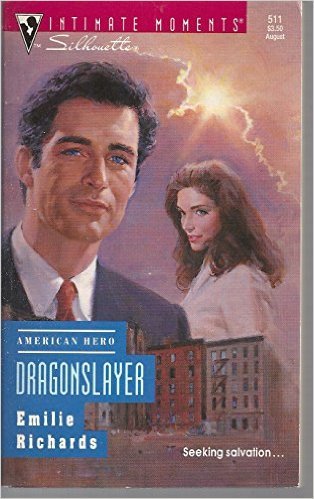 Here’s a quick lesson about publishing. When an author accepts the offer of a traditional publisher, she or he gives that publisher certain rights. One of them usually involves allowing a publisher to publish that book as many ways as the company sees fit.
Here’s a quick lesson about publishing. When an author accepts the offer of a traditional publisher, she or he gives that publisher certain rights. One of them usually involves allowing a publisher to publish that book as many ways as the company sees fit.
When I wrote many of my original romances, ebooks weren’t a twinkle in my publisher’s eye. After all Amazon didn’t even launch until 1995. A series romance novel was at bookstores for a month, maybe two, then it usually disappeared forever. Our book contracts were not broad enough to address the new possibilities that online publishing would bring. And because they weren’t, many years later, my publisher agreed I now have the rights to publish some of those books on Kindle, iBooks, Nook, and other ebook platforms.
Some of you may have downloaded From Glowing Embers this month, which is now free on your favorite device. It’s the first of a four book series, Tales of the Pacific, all of which are now available, and one of the first I published as an ebook after the series was made into movies in Germany. The covers are brand new and the books have each been re-edited for today’s reading audience.
So far I’ve turned six of my former romances into ebooks as well as two women’s fiction novels with a “woo-woo” twist that I wrote for Avons. But I have dozens of books I could republish. So how do I choose what to publish next?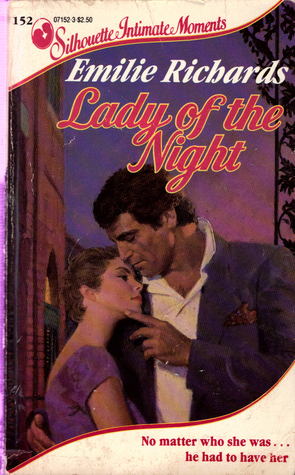
This month I sat down with three of my Silhouette Intimate Moments novels. Intimate Moments novels were “larger than life,” stories filled with suspense, or melodrama or general high jinx. I wrote nineteen before I moved into general fiction–all the Tales of the Pacific books were published in Intimate Moments. Back then general fiction wasn’t really an option. No matter how many issues I tackled or taboos I broke, the books were still published with similar covers in similar ways.
As I looked at the possibilities Dragonslayer seemed an obvious choice. The novel won the RITA award from Romance Writers of America and also received one of what was then Romantic Times Magazine’s rare 5 star reviews. Quite honestly I didn’t know what to expect when I re-read it. It wasn’t one of my best sellers. Dragonslayer straddled genres. The story is romance, women’s fiction and inspirational combined, a book about a minister’s struggle with his loss of faith in God and in himself, and a woman’s struggle to help him find both and bring peace between inner city gangs.
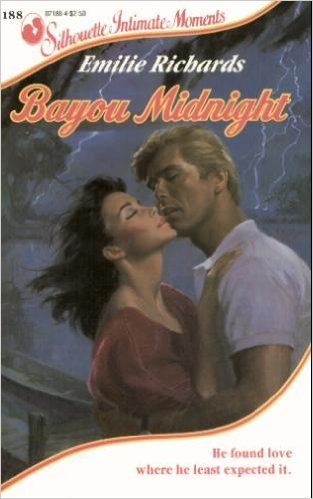 But here’s the problem. Books about ministers don’t always sell well–and I may be the expert on this since I’ve written several. People pigeonhole ministers as pompous, self-righteous, humorless, and rigid. I know this is unfair from my marriage to one and my long association with many, but sadly the image remains.
But here’s the problem. Books about ministers don’t always sell well–and I may be the expert on this since I’ve written several. People pigeonhole ministers as pompous, self-righteous, humorless, and rigid. I know this is unfair from my marriage to one and my long association with many, but sadly the image remains.
Despite that, after reading Dragonslayer I knew it deserved a second chance. It’s probably one of my best romances. And it’s such a perfect complement to The Color of Light, that I knew I needed to release it soon. Along with the cover the novel needs updating, but very few real changes. Watch for Dragonslayer next month.
Next I read Lady of the Night and Bayou Midnight, older romantic suspense novels that I thought might deserve a second life. I finished them this morning. I still love the stories and the New Orleans setting, but I will love them more after I make some changes. What kind? Overwriting. Historical references. Too many yearning glances and not enough backbone. I’ll give some examples of changes as I make them in another blog. I can’t wait to see how they turn out.
Meantime, I hope you’ll enjoy watching me turn my backlist books into ebooks. No, they aren’t the same books I write today. Nor do they have to be. If you don’t love romance novels, they aren’t for you, even with revisions. But if a good love story still delights you, I hope you’ll read along with me.
I’m having fun. I hope you will, too.
The post Turning My Backlist Books into eBooks appeared first on Emilie Richards.
February 20, 2016
Sunday Inspiration: Atticus Finch
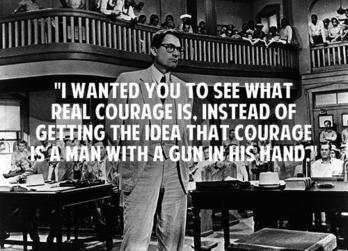 The rest of this quote from To Kill a Mockingbird is:
The rest of this quote from To Kill a Mockingbird is:
“It’s when you know you’re licked before you begin, but you begin anyway and see it through no matter what.”
Harper Lee died yesterday at the age of 89, but her character, Atticus Finch, will hopefully never die. He was one of the most inspiring and courageous heroes of our age, one that influenced so many of us to struggle against racism within ourselves and in our society.
Those who read the Pulitzer Prize winning book and watched the amazing movie, can never forget how this humble man stood up to the bigotry of a small southern town in the 1930s that assumed the inferiority of black people. His six-year-old daughter, Scout, by witnessing her father’s struggle for justice, learns that a conscience is the most valuable gift a person can have. “The one thing that doesn’t abide by majority rule is a person’s conscience,” she is told.
Atticus, and his creator Harper Lee, helped many of us to grow a conscience and the courage to go with it, and we should all give thanks for that precious gift.
The post Sunday Inspiration: Atticus Finch appeared first on Emilie Richards.
February 16, 2016
Promoting a Novel, Then and Now
“Of course they do,” he said. And whether he’s right or wrong, you’re about to.
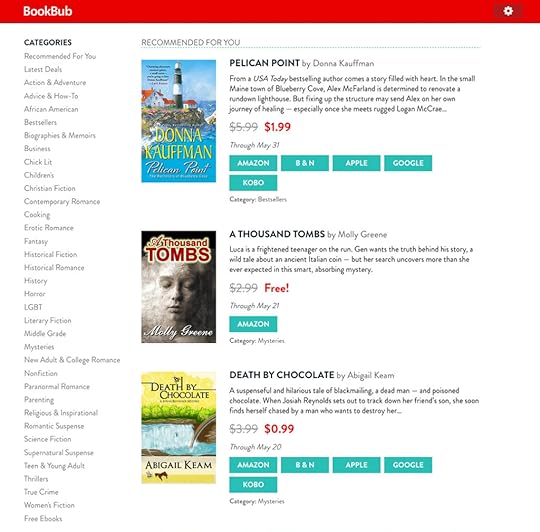 First let’s spiral back in time. There I was a newbie author, not just damp behind the ears but sopping, wringing wet. I thought writing a book would be entertaining. Excruciating months passed, and as it turned out, lots of those months were not entertaining for me or the people who knew me. But I wrote and I wrote and eventually I had something resembling a novel. Lady Fortune knocked at my door, and almost without trying, I found an agent who liked my work, and I had my first sale.
First let’s spiral back in time. There I was a newbie author, not just damp behind the ears but sopping, wringing wet. I thought writing a book would be entertaining. Excruciating months passed, and as it turned out, lots of those months were not entertaining for me or the people who knew me. But I wrote and I wrote and eventually I had something resembling a novel. Lady Fortune knocked at my door, and almost without trying, I found an agent who liked my work, and I had my first sale.
Lady Fortune has a lot to do with publishing careers. Don’t kid yourself.
Back in the eighties, when this story began, those of us who sold contemporary romance novels often sold them to publishers who put out a “line” of books, a certain number each month that had elements in common. In those days there was no email, no Facebook, no blogs like this one. If we wanted to publicize a novel, we printed up newsletters, went down the street to the office supply store to copy them, and stuffed them into envelopes with actual stamps. Our mailing list was hard won from bookstore signings and reader mail that our publisher sometimes forwarded to us.
Truthfully in those days publishers discouraged us from promoting our own books. They wanted to sell lines. They didn’t want to sell individual authors. Wouldn’t we be better off just writing more books?
This is the same question I’ve asked myself all week. I still write for a traditional publisher, but I’m also putting some of the older books I now have rights to online with new covers and new editorial. From Glowing Embers is an example. So I’m a little bit indie and a little bit rock and roll. Cue Donnie and Marie.
Since I began, traditional publishing has seen lots of changes. Authors may not be “encouraged” to help promote their books, but publishers do promote us individually. If we’re lucky they involve us. If we aren’t, at least we aren’t penalized if we call attention to ourselves.
But indie publishing—authors who have conceived, written, and published their own novels–is a whole different thing. We have to make the contacts, pay the dollars, and do the hard work of promoting a novel. The upside is that we then can make sure everything possible is done, and we can be as creative with our promotional ideas as we are with our novels.
Today From Glowing Embers appears in a BookBub ad. BookBub, a daily newsletter with suggestions for free and discounted books, is so popular it gets hundreds of requests to advertise daily. I was lucky enough to secure my ad a month ago, and since then I’ve been working hard to be certain my book is listed as free in bookstores around the world. A fair amount of arm-twisting is involved. I was twisting right up until the beginning of this week.
I also had to be certain all the back matter (everything after “The End”) was updated and rewritten. I had to be certain all the books in the Tales of the Pacific series were properly connected. Then all the new versions had to be reloaded at multiple bookstores.
I won’t tell you how much time that took. Would I be better off just writing more books?
But here’s another question. With thousands of new books being uploaded each week, how would anybody find my book if I didn’t promote it? Even if it happened to be the best book I’ve ever turned out?
I’m looking forward to seeing how well a free novel combined with a BookBub ad sells the other books in my Tales of the Pacific series. If people love From Glowing Embers, I hope they will want to buy one or all of the next three. The hard work has been interesting, and next time I’ll know much better what to do and not to.
Meantime, if you like to learn about new authors and find free or discounted books to read, you, too, can sign up for BookBub. You can specify the genres you most enjoy and then download books that sounds appealing. It’s a win-win.
Want more good news? Today you don’t need BookBub. You can go to any of the bookstores listed on this book page, and download your own free copy of From Glowing Embers. I recommend it.
The post Promoting a Novel, Then and Now appeared first on Emilie Richards.
February 13, 2016
Sunday Inspiration: Mature Love
 Happy Valentine’s Day everyone. So what is this day all about? For many it’s an opportunity for some special attention, and for others it can be painful and lonely.
Happy Valentine’s Day everyone. So what is this day all about? For many it’s an opportunity for some special attention, and for others it can be painful and lonely.
Remember Erich Fromm? The Art of Love was one of my favorite books in college because he had such a deep understanding of the dynamics of relationships.
When we’re young we tend to base our love on our own selfish needs, but as we grow older we hopefully see that love is what pulls us out of ourselves so that we can connect not only with one person but with those around us.
“If I truly love one person, I love all persons, I love the world, I love life,” wrote Fromm. When we fall in love with one person the gates swing sloly open to enlarge our circle of love wider and wider.
I hope you will find a way to express your love today not only for your special beloved but to all those who have shared their life and love with you. Pick up that phone or that pen. Wave at a neighbor. And don’t forget to hug your dog, your kitty or sing along with the birds outside your window. All living things will enjoy a little extra love today. I hope you are among them.
The post Sunday Inspiration: Mature Love appeared first on Emilie Richards.
February 10, 2016
Who Am I To Criticize Downton Abbey, But. . .
 ***Spoiler alert: If you haven’t seen Downton Abbey recently and don’t want to find hints of what’s going on here, read one of my older blogs and save this one until you’re ready.
***Spoiler alert: If you haven’t seen Downton Abbey recently and don’t want to find hints of what’s going on here, read one of my older blogs and save this one until you’re ready.
I’ve been a big Downton Abbey fan from the beginning of the show. I’ve enjoyed this well-researched peek at the upper and serving classes of England from post-Edwardian times through the years leading up to World War II. If Mary, Edith and others didn’t age or change substantially during that period, who was I to quibble? Their hairstyles changed, as did their hemlines. This is fantasy, and that part was easy to overlook.
Also easy to overlook was the cordial, dare I say friendly rapport between the Crawleys and their servants. In reality, historians tell us that servants would have been as invisible as possible, and certainly not as well cared for.
In a recent episode Mary sits at dinner with a young woman visitor, and after the temporary butler snidely points out that the woman was once in service there, haughty Mary is unhappy. She feels as if she’s been made a fool of. Mary, or perhaps someone else at the table, points out that the woman was right there under their noses, but they never exchanged a word or even really looked at her.
Never mind Anna and Bates, Daisy and Mr. Barrow. That snatch of dialogue was as real as any on the show.
Downton has never been a hotbed of drama. There have certainly been dramatic moments. Lady Sybil’s death. The sudden death of Mary’s first lover in her very own bed. Bates in prison. In between spikes of passion and angst, the family and their staff have gone about the business of their lives with good humor and snappy dialogue.
But lately. . .
This final season has been a disappointment. Perhaps the reason is simply that it is the final season, and Julian Fellowes, who created the series, is so busy tying up plot lines, that there is no time for drama. Stories that have spun out over several seasons have ended without fanfare. For instance over seasons Tom, Lady Sybil’s chauffeur husband, has gone from a fiery Irish rebel devoted to social change to the family pussycat. His short-lived trip to America ended recently–most likely because the actor’s other film or TV commitments ended–and he returned back to the Abbey to report that Downton is really his home and the Granthams are his family. I don’t think a single tear was shed anywhere in the universe during this not-so-touching moment.
For a writer of novels, television shows or any other form of fiction, suspense and drama are employed to keep a story moving. Whatever suspense there has been this season has ended in mere moments. Is the Earl of Grantham going to die? Oh, no, he’ll be fine. Will Daisy lose her job? No, because the aristocrats are just too kind not to help her, thereby teaching her a lesson about trusting the upper classes who only have her welfare at heart.
Perhaps, too, Fellowes is simply and understandably tired of the show, of the family, of the milieu, even the history of the era and ready to take on a new challenge. Writers do get tired. Ideas wither on the vine. Series feel finished, and no matter how much the viewers or readers want them to continue, endings are inevitable.
I am properly grateful for this peek into the not-so-realistic past, in a world where my own ancestors were probably delivering fresh vegetables to the back of the house or at best rapping knuckles in the nursery. I’ve loved every moment, but I am sorry the saga is ending with a whimper, not a bang.
I have not, however, noted anyone else complaining. Downton Abbey is now an institution, and viewers and readers and yes, even critics, are so caught up in the spell that an absence of drama or surprises is barely noted.
We’re all saying goodbye in our own way. And yes, I will miss you, Downton. Sunday nights will never be quite the same. Bless you for all those moments of history and entertainment. You deserve to rest on your laurels. I just wish that”rest” had begun after the show was well and truly over.
The post Who Am I To Criticize Downton Abbey, But. . . appeared first on Emilie Richards.
February 6, 2016
Sunday Inspiration: The Spirit of Mardi Gras
 Yes, Mardi Gras is almost here! Fat Tuesday is only two days away, and if I was still living in New Orleans that would be all everyone was talking about.
Yes, Mardi Gras is almost here! Fat Tuesday is only two days away, and if I was still living in New Orleans that would be all everyone was talking about.Carnival Season actually begins on Twelfth Night and ends on Mardi Gras day with Lent closing the partying down after midnight. The excitement and parties and parades pick up pace in that intervening time until the wild and jubilant climax on Fat Tuesday when spectacular parades run all day with thousands of people cheering at full throttle, dancing to the raucous bands that prance down the streets, and grabbing for colorful beads, doubloons and other trinkets that fill the air. (In our days in the city we caught bikini panties, ice cream scoops and umbrellas.)
It’s hard to imagine unless you’re there.
The roots of Mardi Gras are religious, growing out of the Roman Catholic tradition, and though in many ways the holiday has become secular and sensual, it’s still spiritual at its heart, celebrating love of life in all its many glorious manifestations.
Chris Rose expresses the spirit of Mardi Gras well in his excellent book “1 Dead In Attic: Post-Katrina Stories.”
“To encapsulate the notion of Mardi Gras as nothing more than a big drunk is to take the simple and stupid way out, and I, for one, am getting tired of staying stuck on simple and stupid.
Mardi Gras is not a parade. Mardi Gras is not girls flashing on French Quarter balconies. Mardi Gras is not an alcoholic binge.
Mardi Gras is bars and restaurants changing out all the CD’s in their jukeboxes to Professor Longhair and the Neville Brothers, and it is annual front-porch crawfish boils hours before the parades so your stomach and attitude reach a state of grace, and it is returning to the same street corner, year after year, and standing next to the same people, year after year–people whose names you may or may not even know but you’ve watched their kids grow up in this public tableau and when they’re not there, you wonder: Where are those guys this year?
It is dressing your dog in a stupid costume and cheering when the marching bands go crazy and clapping and saluting the military bands when they crisply snap to.
Now that part, more than ever.
It’s mad piano professors converging on our city from all over the world and banging the 88’s until dawn and laughing at the hairy-shouldered men in dresses too tight and stalking the Indians under Claiborne overpass and thrilling the years you find them and lamenting the years you don’t and promising yourself you will next year.
It’s wearing frightful color combination in public and rolling your eyes at the guy in your office who–like clockwork, year after year–denies that he got the baby in the king cake and now someone else has to pony up the ten bucks for the next one.
Mardi Gras is the love of life. It is the harmonic convergence of our food, our music, our creativity, our eccentricity, our neighborhoods, and our joy of living. All at once.”
Happy Mardi Gras to all of you!
The post Sunday Inspiration: The Spirit of Mardi Gras appeared first on Emilie Richards.
February 2, 2016
Five Characters Readers Hate

I’ll confess no matter how good my trips, I miss my dog, my house, my bed and the birds and alligator who regularly visit my backyard. I’m always glad to get back to them.
I’m even glad to get back to work.
Returning this weekend I immediately launched back into writing mode, and today I returned to my proposal in progress. I told you that I wrote several. Mini, short and long. The problem is that my agent wasn’t thrilled with my characters in the mini version. One major character in particular seemed much too dark. Since I hadn’t envisioned her that way, I gave myself the vacation break and re-read the mini-synopsis today. And yes, my agent was right. The woman I want to portray and the one on the page are quite different. Granted this is a short synopsis and I can only pad it with a little detail, but my characters still have to jump off the page and become the people readers will want to know.
So what makes a character sympathetic? Or more fun, what makes one unsympathetic? When I fling a book across the room (figuratively) what makes me do it? Why do I care so little about the people in a novel that I don’t want to know how their lives turn out? I’m not talking about villains or secondary characters we are meant to hate. I’m talking about major characters we are supposed to care about. Characters we want to root for but simply can’t.
Here are five characters readers hate, or at least my take on them. I’m sure I’ve left out one or two you personally can’t stand to read about. Please share. Lists are made to be expanded.
 Bullies. A man or a woman who forces other people to do things their way is hard to love. These are women and men who shut down conversations. They scream or rant or give others the silent treatment. They use size, either mental or physical, against a smaller person. They bribe, manipulate, insist. Rex, in
No River Too Wide
, is the worst kind of bully, but that story revolves around his wife’s escape from him. In fact we never actually meet Rex. Had his wife been the bully, insisting others help her, ranting about how nobody cared enough, forcing them to assist her, the book would have been a wall banger.
Bullies. A man or a woman who forces other people to do things their way is hard to love. These are women and men who shut down conversations. They scream or rant or give others the silent treatment. They use size, either mental or physical, against a smaller person. They bribe, manipulate, insist. Rex, in
No River Too Wide
, is the worst kind of bully, but that story revolves around his wife’s escape from him. In fact we never actually meet Rex. Had his wife been the bully, insisting others help her, ranting about how nobody cared enough, forcing them to assist her, the book would have been a wall banger.Narcissists. These are the characters who truly believe the world revolves around them. Their needs are primary, and they pay no attention to other people’s opinions or feelings. Since we, as readers, want to be part of a real story unfolding in front of us, confronting a narcissist makes us uneasy. We’ve run into these people in real life. We know they don’t care about us. Why should we read about them?
 Sadists. Unlike bullies, who have goals they want accomplished and will do almost anything to reach them, the sadist just enjoys inflicting pain. A truly talented author might be able to make us understand and sympathize with the little boy pulling the wings off a butterfly, but once he reaches adulthood, he or she is going to be almost impossible to love. Most readers won’t get that far no matter what has turned the child into the adult he is.
Sadists. Unlike bullies, who have goals they want accomplished and will do almost anything to reach them, the sadist just enjoys inflicting pain. A truly talented author might be able to make us understand and sympathize with the little boy pulling the wings off a butterfly, but once he reaches adulthood, he or she is going to be almost impossible to love. Most readers won’t get that far no matter what has turned the child into the adult he is.Whiners. Characters are allowed, for a moment here or there, to feel sorry for themselves. After all, sometimes the novelist has piled so many problems on top of them they’re feeling smothered. A moment here and there of self-pity makes a character feel real. But only a moment. A character who whines about her or his fate throughout the book, who would prefer to complain rather than take action and try to change their situation, is boring. If we run into a whiner at a party, we probably run the other way. Our sympathy dissipates quickly if there seems to be no attempt to cope or change. Same goes in a book. Why bother?
 Do-Gooders. Now I bet some of you are thinking about the Goddesses Anonymous series, right? If ever there was a bunch of do-gooders, there they are. Except that I’m not talking about people who try to live their highest values. I’m talking about people who ferret out weaknesses, who meddle, who advise when it’s not asked for, who search for weaknesses in others and gleefully prove how much better they are because they know how to help. The difference is subtle, but we know it when we see it. They “help” so they will be thought of as helpers (See #2) and to edge their ways into the lives of others where they can become bullies, too. (See #1.)
Do-Gooders. Now I bet some of you are thinking about the Goddesses Anonymous series, right? If ever there was a bunch of do-gooders, there they are. Except that I’m not talking about people who try to live their highest values. I’m talking about people who ferret out weaknesses, who meddle, who advise when it’s not asked for, who search for weaknesses in others and gleefully prove how much better they are because they know how to help. The difference is subtle, but we know it when we see it. They “help” so they will be thought of as helpers (See #2) and to edge their ways into the lives of others where they can become bullies, too. (See #1.)Five characters readers hate. Am I right? I’m glad to say the character in my synopsis is none of these things. Her problems, thankfully, are subtler. That’s a good start. And now to fix those problems, too.
Agree? Disagree? Do you have additions? We’d love to hear them.
The post Five Characters Readers Hate appeared first on Emilie Richards.
January 30, 2016
Sunday Inspiration: Friendship
 I’m returning today from a week-long Caribbean cruise with my husband and three couples who have become good friends.
I’m returning today from a week-long Caribbean cruise with my husband and three couples who have become good friends.
I so much enjoyed the tropical beauty, the delicious food, the entertainment, and the peace and quiet. But best of all was the joy of being with my friends.
Perhaps a useful definition of friendship is enjoying a cruise with people so much that you decide to do it again. And that’s what we did. After sailing together last winter, we all immediately booked this cruise so we could be together again.
But another definition of friendship is the one above: friends are those special people who understand where we’ve been and what we have become, and still, gently allow us to grow. That’s not easy because there are parts of each one of us we are ashamed of, parts we would prefer no one witness.
And yet to be a friend is to gently share those secrets and find to our amazement that we’re still accepted and embraced. I’ve explored that theme over and over in my novels. I guess it really resonates for me. Does it do the same for you? Have you found that by sharing, both you and your friends are happier for it?
I’m thankful for my friends, far and near. They have made me life so much richer. I hope each of you can say the same.
The post Sunday Inspiration: Friendship appeared first on Emilie Richards.



